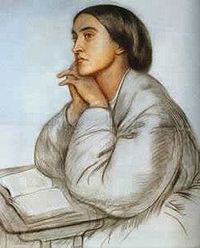
 It’s the holiday season, and unfortunately, this can be a difficult time for people who have lost loved ones. Although this makes it hard to get into the cheerful holiday spirit, we must keep in mind that whoever has passed, whether it’s a family member or a friend, would not wish for us to feel sad. This is the message conveyed in poet Christina Rossetti’s poem, “When I am dead, my dearest”:
It’s the holiday season, and unfortunately, this can be a difficult time for people who have lost loved ones. Although this makes it hard to get into the cheerful holiday spirit, we must keep in mind that whoever has passed, whether it’s a family member or a friend, would not wish for us to feel sad. This is the message conveyed in poet Christina Rossetti’s poem, “When I am dead, my dearest”:
When I am dead, my dearest,
Sing no sad songs for me;
Plant thou no roses at my head,
Nor shady cypress tree:
Be the green grass above me
With showers and dewdrops wet;
And if thou wilt, remember,
And if thou wilt, forget.
I shall not see the shadows,
I shall not feel the rain;
I shall not hear the nightingale
Sing on, as if in pain:
And dreaming through the twilight
That doth not rise nor set,
Haply I may remember,
And haply may forget.
Rossetti does not wish for people to mourn for her in sorrow. She plainly instructs, “Sing no sad songs for me;/Plant thou no roses at my head,/Nor shady cypress tree” (2-4). The poet does not even wish to have memorial “roses” or “tree[s]” surrounding her grave, because she does not want her death to be seen as a big deal. Instead, she wishes for her mourners to “Be the green grass above me” (5), or to view her death as a natural occurrence that comes as part of the cycle of life, just like growing grass.
The most important request of Rossetti’s is, “And if thou wilt, remember,/And if thou wilt, forget” (7-8). In saying this, she emphasizes her desire for her family and friends to “remember” the good times, their happy memories of her, but to “forget” the grief that comes along with her death. In such a time as this, the holidays, she would not have those that she loves think about her absence; she would rather they reminisce about all the times they did share with her.
Rossetti also stresses the fact that death means escaping the negative aspects of life, such as the “shadows,” (9) the “rain,” (10) and “the nightingale” (11) that “sing[s] on, as if in pain” (12). In saying this, she affirms that it is not death that is dreary, but all of the things she lists. Death is a “twilight” (13) that is eternal and through which the poet gets to “dream[]” (13) endlessly. She, in death, is also able to choose what she “remember[s]” (15) and what she “forget[s]” 16), and it will no doubt be the positives that she calls to mind.

 “When I am dead, my dearest” by Christina Rossetti
“When I am dead, my dearest” by Christina Rossetti


 Our Monthly Tip: Make an “In Case of Death” File to Ease Loved One’s Grief
Our Monthly Tip: Make an “In Case of Death” File to Ease Loved One’s Grief
 Passing of Beloved Comedian Births a New Comedy Festival
Passing of Beloved Comedian Births a New Comedy Festival
















A delightful old poem of 150 years during the Christmas holiday, a holiday that’s been around even longer.
Report this comment
A nice dear poem……..
Report this comment
Forget the grief. Do remember all the times we did share. It is the positive we will always remember. Evening twilight time was indeed dream like.
Unique beyond words.
Report this comment